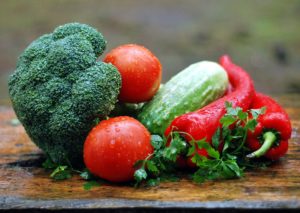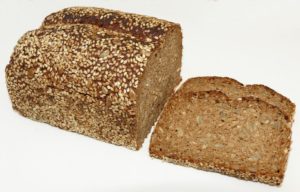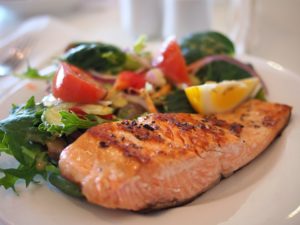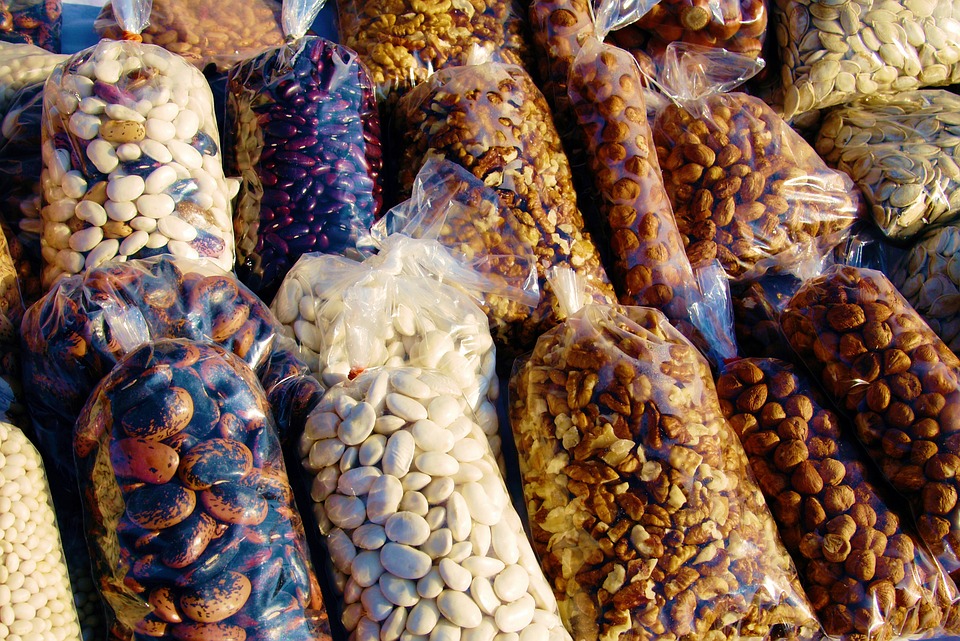Nut 101 (brief nutrition review, Part 1)
Oh, no! You may say… A review of nutrition? Ugh, sounds like 9th grade health class!
But, even though it sounds boring, understanding the basic nutritional needs of our body is VERY important. After all, whether we want to admit it or not, we are what we eat.
Our body needs six basic nutrients, consumed in a balanced manner, every day. These are:
- Protein
- Carbohydrates
- Fats
- Vitamins
- Minerals
- Water
Protein is necessary for the building and repair of body tissues. Amino acids are the building blocks of protein. Our body produces some amino acids, but others we must get from food. Sources of complete protein (foods which contain all the amino acids we need) include meat, fish, poultry, milk, yogurt, eggs, and soybeans. Each gram of protein we consume supplies four calories.

Other sources of proteins are whole grains, corn, legumes (dried beans and lentils), nuts, and seeds.

A vegetarian diet can provide all the essential amino acids our body needs. About 15% of our total caloric intake each day should come from protein.
Carbohydrates are our main source of energy and also contain four calories per gram (same as protein). Carbohydrates include sugar (simple carbohydrates), starches, and fiber. Any excess carbohydrates that are not used for energy are stored in the body and converted to fat (which is why we need to be careful with what type and how many carbs we eat). We get carbohydrates from vegetables, potatoes, pasta, bread, cereal, rice, bran, popcorn, and fruit.

Simple carbohydrates are sugars that enter the blood stream quickly and provide fast energy. Sugars occur naturally in fruits, honey, and milk. Processed (simple) sugar is added to many foods (candy, cake, cookies, sweetened beverages are examples). We should limit added sugar to less than 10% of our daily calories. For a 2,000 calorie a day diet, that’s 200 calories of sugar (not many when considering sodas, snacks, and ice cream contain large amounts of sugar). Simple sugars provide calories, but few other nutrients. We should limit our consumption of simple sugars. These include snack and dessert foods, plus “white” foods such as white bread, rice, and Irish potatoes.

In contrast, complex carbohydrate (starches and fiber) are much healthier for us. Complex carbohydrates provide longer lasting energy and require more energy to digest (an advantage over simple carbs).

Fiber (an important asset of complex carbohydrates) keeps our digestive system healthy and helps us maintain healthy bowel habits. Fiber is more filling and is beneficial for maintaining a healthy weight. We should consume 50 to 55% of our daily intake of food in the form of carbohydrates.
For those of you who have tried (or are currently eating) a low carb diet…
Yes, a low carb diet can help you lose weight–initially. However, a low carb diet is not healthy for the long term. Your body misses the healthy nutrients provided by complex carbohydrates. Most of our difficulty with carbohydrates is not that we eat them–but, that we eat too much sugar because we select simple carbs. Remember, instead of sugary drinks, snacks, desserts, white bread, pasta, potatoes, etc, our choices of carbohydrates should primarily include fresh fruits and vegetables (eaten as close to their original form as possible) and whole grain products.
Today we’ve reviewed two of our six important nutrients–protein and carbohydrates. There are two more important points…
What foods we select from these nutrients and how we prepare our food makes a tremendous impact.
For proteins, if you are a meat eater, fish and poultry are your healthiest choices. If you are a beef and pork consumer, select the lean cuts, try to limit your portions to 4 ounces or less, and avoid fried foods.

For carbohydrates, again–avoid frying if possible (this means french fries should only be an occasional treat!) Also, be careful of adding too much dressing or other high sugar/high fat ingredients to fruits, vegetables, and bread.
It sounds like I’m trying to get you to give up all good food. Not so! Even without fried foods, unhealthy snacks, and rich desserts–there’s so much great food from which to select!
Next week we’ll talk about two more essential nutrients–fats and vitamins.
